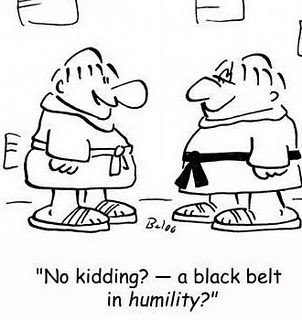 I get a huge kick out of Donald Trump, and this is not just because I like what he’s doing. I’m talking about his unfiltered remarks like asking the clergy at the National Prayer Breakfast to pray for Arnold Schwarzenegger’s ratings on Celebrity Apprentice. I loved every crack, every dig, every barb he let fly during the debates. I just may be in the minority here, I realize. I even like the way he brags on himself and his achievements. But Trump is not my point here. He’s simply a prominent example of what I want to discuss this time. Is it bad to brag? Not necessarily.
I get a huge kick out of Donald Trump, and this is not just because I like what he’s doing. I’m talking about his unfiltered remarks like asking the clergy at the National Prayer Breakfast to pray for Arnold Schwarzenegger’s ratings on Celebrity Apprentice. I loved every crack, every dig, every barb he let fly during the debates. I just may be in the minority here, I realize. I even like the way he brags on himself and his achievements. But Trump is not my point here. He’s simply a prominent example of what I want to discuss this time. Is it bad to brag? Not necessarily.
Many of the President’s critics seem to pounce on anything he says, just because he is the one saying it. They like to suggest that Trump’s boasts are dead giveaways that he is deranged and should be removed from office. Others, with less of an axe to grind, are content to accuse Trump of overcompensating for an inferiority complex. That may be, but it is a little disturbing to me when bold self-confidence is taken as a symptom of insanity.
It is of course pathetic when people boast who have nothing to boast about. But I think the contempt we automatically feel should morph into compassion, even if it’s only to think, “Poor schmuck!†But what if the boasting is justified? Sometimes it is. Some people are great and have done great things. When they brag, they are simply being realistic. I won’t say that, in that case, it is humility or modesty, but it almost is.
I find it more offensive when people clothe themselves in false humility, either because they are fishing for compliments or because they superstitiously fear being struck down by Karma if they do openly rejoice over their talents or their accomplishments. Such humility may mean that a gifted individual is shirking his destiny. I just watched the old movie Abe Lincoln in Illinois, which depicted unassuming Abe as just wanting to be left alone. His shrewish wife, Mary Todd, made life miserable for him, but she was right to recognize his destiny and to nag him into fulfilling it. Was Abe’s humility an admirable trait? One level, yes. But on another, this seeming virtue was a stumbling block. Conversely, the braggadocio of someone like Trump may just mean he is full, not so much of himself, but of his destiny. I’m no mind reader, so I don’t pretend, as others rush to do, to psychoanalyze a man at long distance, through the TV. I’m exploring something in the abstract.
they are fishing for compliments or because they superstitiously fear being struck down by Karma if they do openly rejoice over their talents or their accomplishments. Such humility may mean that a gifted individual is shirking his destiny. I just watched the old movie Abe Lincoln in Illinois, which depicted unassuming Abe as just wanting to be left alone. His shrewish wife, Mary Todd, made life miserable for him, but she was right to recognize his destiny and to nag him into fulfilling it. Was Abe’s humility an admirable trait? One level, yes. But on another, this seeming virtue was a stumbling block. Conversely, the braggadocio of someone like Trump may just mean he is full, not so much of himself, but of his destiny. I’m no mind reader, so I don’t pretend, as others rush to do, to psychoanalyze a man at long distance, through the TV. I’m exploring something in the abstract.
Proverbs says “Don’t praise yourself; let others do it.†I like that. But I feel like proper humility is, again, essentially just realistic self-assessment. If you’re talented, admit it and show you are thankful or lucky. There is no pretension there, and it’s pretension that I hate. I guess the dividing line is what you are trying to achieve by acknowledging your greatness. Are you fishing for compliments? That is pathetic. But when the great remark on their greatness as a simple observation, what’s so bad about that?
Many years ago, the pastor of my church plainly viewed himself as a new Kierkegaard. But that was okay with me, since he was a new Kierkegaard. He wasn’t trying to get you to think he was the new Dour Dane. You could just pick up on his self-understanding. If he had been self-deluded, it would have been ludicrous. Quite a difference.
“The difference is that they’re not in love with themselves. Instead, they’re in love with their mission.”
Sometimes great people chafe those around them with their self-absorption and their tendency to take their followers’ efforts for granted. You may not like their “dictatorial†style, their headlong pace, their insistence on their own way. But don’t you see? That’s part of the package! It’s not necessarily narcissism; it’s momentum. The difference is that they’re not in love with themselves. Instead, they’re in love with their mission. I have been lucky to know and to work with such individuals.
Paul Kurtz was one such. It was sometimes hard to work with him. He tended to alienate donors who, e.g., wanted their contributions directed to some particular project, often of their own invention. Paul always responded, “Thanks, but why don’t you just donate the money and let us decide what to do with it?†He’d hire people to do some job but then wouldn’t let them do it. These were flaws, but they were side-effects of his strengths, without which there would have been no Council for Secular Humanism, no Center for Inquiry, no Prometheus Books, no Free Inquiry.
Bob Funk, co-founder of the Jesus Seminar, was another powerhouse, another human locomotive. You could climb aboard, but he was the conductor, and people occasionally got run over. But no Funk, no Jesus Seminar. No Westar Institute. No Fourth R. No Five Gospels, and so on and so on. You just had to get used to it. Was his endeavor something you wanted to lend your energies to? If so, you had to get used to not being pampered. Maybe not even appreciated. Ask any soldier.
I never met him, but Arkham House publisher, naturalist, poet, and author August Derleth was yet another one. He was a dynamo. He made plenty of omelets and did not hesitate to break some eggs. He cut corners. He lived a sloppy life in some respects and invited numerous criticisms, but these volcanic doers and achievers are hurtling onward and cannot always contain themselves or pause to ponder every decision. Such is the price they, and we, pay for the creativity and dynamism that create the things we remember them for.
Should they pause and submit their ideas to an oversight committee? There might be less controversy, but less would be achieved. Here I believe Ayn Rand was right: the collectivity dilutes and smothers the unique greatness of the gifted individual. Nietzsche was right, too: the Superman must not allow himself be bound and gagged by the Lilliputians who hate him for being a living rebuke to their cowardice and mediocrity.
The danger, of course, is that an impatient achiever may exceed the prescribed limits of his power. Such an executive may become a dictator. You remember how the Roman Republic made provision for a legally empowered dictator in times of emergency when there’s no time to weigh all opinions. (Here, for some reason, I can’t help thinking of the time I was invited to address an Ethical Culture Society meeting about the historical Jesus question. They went around the circle having everyone present pose their questions for me to address all at once. But when they were finished, the meeting was over! No time left! They felt, as they admitted, that it was more important to hear all the members out than to hear the invited speaker! Ayn, are you listening?) I suspect what the Romans did would be impossible today, to our peril. Even when decisiveness is needful, I think we will be paralyzed with dithering and debating.
I do have one suggestion for curbing megalomania, for of course even the genuinely great (Greek megalé) can suffer from megalomania. I think the key to perspective on oneself is having a sense of humor about oneself. Be able to see the comical dimension of yourself. Don’t take yourself too seriously. Catch yourself being pompous and think how silly others look doing the same thing. Go ahead and brag if you’ve got something to brag about, but be just as quick to laugh at yourself. That ought to do it. That’ll puncture your hot air balloon. As a windbag, I know whereof I speak.
So says Zarathustra.

4 Responses to The Art of the Boast